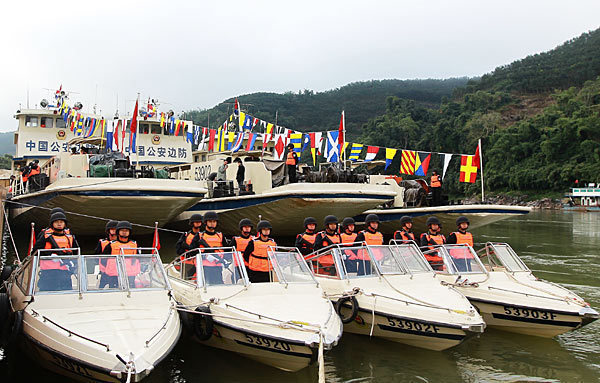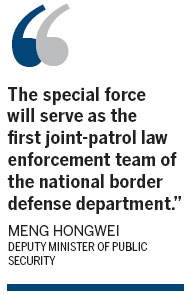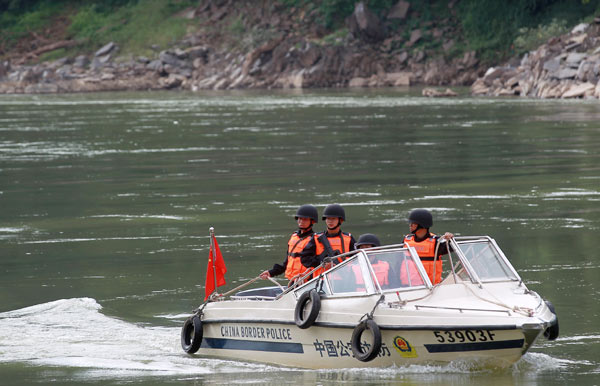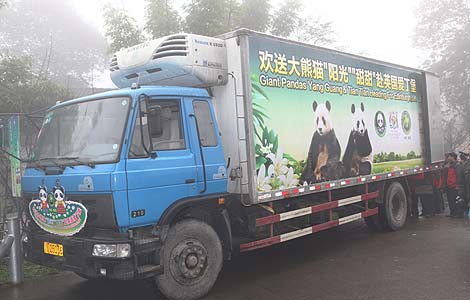Chinese police patrol deployed in border port
Updated: 2011-12-10 07:49
By Zhang Yan, Cui Haipei and Guo Anfei (China Daily)
|
|||||||||
 |
|
A special police team for patrols along the Mekong River is launched in Yunnan province, Nov 9, 2011. The team is made up of more than 300 police officers selected from the border police force. [Photo by Cui Meng/China Daily] |
Chinese unit joins multinational force to safeguard cargo shipping
XISHUANGBANNA, Yunnan - The Chinese detachment of a four-nation armed Mekong River patrol was deployed on Friday as China, Laos, Myanmar and Thailand established the law enforcement command center for the units in the port of Guanlei, in Yunnan province.
The joint patrols have been established in answer to attacks on ships on the river, specifically the murder of 13 Chinese sailors two months ago, the Ministry of Public Security said.
 |
"The special force will serve as the first joint-patrol law enforcement team of the national border defense department, committed to safeguarding the international waterway security with partners from Laos, Myanmar and Thailand," Meng said.
In recent years, extortion, robbery, and gang crimes, such as drug smuggling, and arms trafficking, have become prominent on the Mekong. There have been attacks on commercial ships, including property theft and acts of violence against sailors, he said.
To maintain public safety on the Mekong River, and ensure there will be no more tragedies like the Oct 5 murders, the four partners reached consensus, and have established the Mekong River Basin law enforcement and security cooperation mechanism, he said.
Meng Sutie, director of the Yunnan public security bureau, told China Daily: "The main aim of the joint law enforcement is to effectively combat crime, ensure public order on the river, and mediate in some disputes."
Criminal gangs on the river have always been active at the junction of the countries, limiting what could be done to stop them.
"As the joint patrol law enforcement mechanism gradually improves, the four nations can share timely intelligence information to form an integrated force to fight these crimes," he said.
Each contingent of the joint law enforcement patrol has been asked to get familiar with the costal geography, the security risks of the complex watersheds or locations, criminal means of the foreign armed fractions, and understand or respect foreign customs and taboos.
Thirteen Chinese sailors aboard two cargo ships, Hua Ping and Yu Xing 8, were killed, with their hands tied behind their backs, on Oct 5. After the massacre, shipping on the waterway came to a halt.
The joint law enforcement mechanism will greatly improve safety on the Mekong River, Douang Ma La, deputy director of the Laos Border Defense Bureau, told China Daily.
"Sailors will be safe in the future because of the patrol ships," he said. "Laos will intensify cooperation with China, Myanmar and Thailand to safeguard the watershed stability and safety."
Luo Jianzhi, captain of the Heng Da, has been sailing the river for 12 years, mainly for transporting agricultural products and electrical equipment to Thailand.
Luo said that although he is looking forward to resuming navigation of the river, personnel security remains a concern among sailors.
"I think the law enforcement patrol mechanism can protect our safety to an extent, but we still worry because there are many dangerous sections along the river, such as Mengbaliao and Mengmu, where drug and gun trafficking is rampant," he said.
"Meanwhile, the riverbank is surrounded by high mountains and deep forests, and we were already under attack sometimes before we could even react," he said.
"We hope that armed police will patrol the whole river, or place police officers on our cargo ships," he added.
 |
|
The Chinese police officers patrol the Mekong River in Yunnan province, Nov 9, 2011. [Photo by Cui Meng/China Daily] |
Su Hao, director of the Asia-Pacific research center at China Foreign Affairs University in Beijing, hailed the joint patrols as a groundbreaking action, since they are the first multinational security cooperative mechanism between China and its neighbors, and also the first multinational security cooperation in China's history.
Su said the joint police patrols are characterized by each country emphasizing multilateral security cooperation targeting multinational criminal forces; a cooperative effort between police instead of military units.
"In China, it is led by the Ministry of Public Security, with frontier forces and armed police also participating," Su said.
Su also said the joint police patrols are different from the escort of Chinese navy ships in Africa's Gulf of Aden in terms of their mechanisms.
"China's escort missions in the Gulf of Aden are led by the Defense Ministry, and are an armed forces operation. But the security cooperation in the Mekong River is a police operation," said Su.
"Besides, the action in the Gulf of Aden is a unilateral action, while the operation on the Mekong River is a multinational cooperation," he added.
Wang Yan in Beijing contributed to this story.











